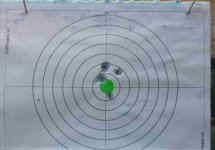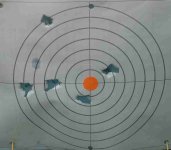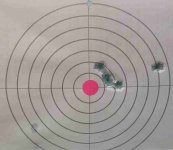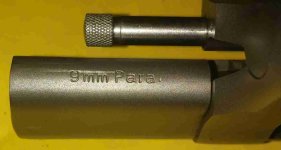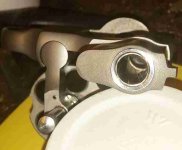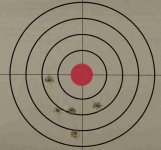Need help with a Taurus 905 SS revolver problem (PICS)
I bought this revolver because I only reload 9mm Luger.
With Winchester white box it will shoot all day with no problems. First target below is Winchester showing no keyholes.
When I use my Dardas hard lead, 125 grains 0.356” RNBB with 3.9 grains of green dot and OAL 1.140” I get multiple key holes, second target below.
I slugged the cylinder at 0.35”’ and when I slugged the barrel I was shocked to find it at 0.357”. This is 0.001” bigger than the cylinder! So even if I were to go to a larger diameter 9mm bullet the cylinder will knock it down to small for the barrel; so I will still get barrel leading and key holing. The Taurus manual says they will do no warranty for reloads. I have been told that Taurus will not sell parts to the public? Anyone have any experience with this. I would love to buy a slugged 0.355” replacement barrel. If I reload with plated berry bullets would they lead the barrel? Or do I have to go to FMJ reloads?
Are there any other solutions that I am missing?
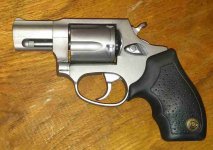
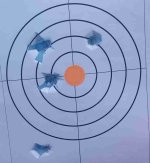
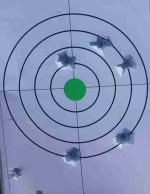
I bought this revolver because I only reload 9mm Luger.
With Winchester white box it will shoot all day with no problems. First target below is Winchester showing no keyholes.
When I use my Dardas hard lead, 125 grains 0.356” RNBB with 3.9 grains of green dot and OAL 1.140” I get multiple key holes, second target below.
I slugged the cylinder at 0.35”’ and when I slugged the barrel I was shocked to find it at 0.357”. This is 0.001” bigger than the cylinder! So even if I were to go to a larger diameter 9mm bullet the cylinder will knock it down to small for the barrel; so I will still get barrel leading and key holing. The Taurus manual says they will do no warranty for reloads. I have been told that Taurus will not sell parts to the public? Anyone have any experience with this. I would love to buy a slugged 0.355” replacement barrel. If I reload with plated berry bullets would they lead the barrel? Or do I have to go to FMJ reloads?
Are there any other solutions that I am missing?




